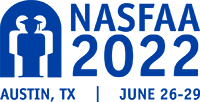FAFSA Simplification Implementation: How It's Going and How Schools Are Involved
By Megan Walter, NASFAA Policy & Federal Relations Staff
Moderator:
Rachelle Feldman, Vice Provost of Enrollment at the University of North Carolina at Chapel Hill
Speakers:
Anthony Jones, Executive Director of Financial Aid & Scholarships at the University of Utah
Alex DeLonis, Director of Financial Aid at Wabash College
Karen McCarthy, NASFAA Vice President of Public Policy & Federal Relations
Speaking to a packed room, Alex DeLonis from Wabash College, Anthony Jones of the University of Utah, and NASFAA's Karen McCarthy started their session speaking about how Federal Student Aid (FSA) is engaging with school stakeholders to implement the 2024-25 FAFSA.
McCarthy and DeLonis outlined the charter of NASFAA’s FAFSA Simplification Implication Working Group, including some of their work providing technical assistance to the Department of Education (ED) on topics such as IRS data-sharing consent, the FSA Toolkit, the sex/gender question on the FAFSA, the removal of the number in college from the FAFSA and how that relates to or may impact professional judgment requests, and family size and conflicting data.
Jones then spoke to some of the FAFSA Simplification Act provisions that have already been implemented, such as survey questions on race and gender for the 2023-24 FAFSA, the creation of the incarcerated applicant form, and the removal of both the Selective Service and drug conviction questions from the 2023-24 FAFSA.
The presenters were quick to remind the audience that there are still many outstanding issues and pieces surrounding FAFSA simplification, some of which will greatly affect financial aid offices. Some of those outstanding questions include data elements not included in the legislative text, the definition of a family farm, as well as the implications of a negative Student Aid Index (SAI) on financial aid packaging.
To end the session, McCarthy showcased the SAI Modeling Tool developed by NASFAA, which shows how institutions may expect to see their Pell Grant recipients change with the introduction of the SAI. She then opened up the room to conversation to exchange ideas on how NASFAA's working group can assist schools in a smooth implementation leading up to the roll-out of the new FAFSA on Oct. 1, 2023.
Publication Date: 6/28/2022

You must be logged in to comment on this page.